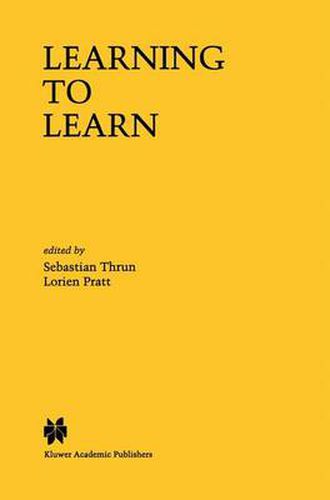Readings Newsletter
Become a Readings Member to make your shopping experience even easier.
Sign in or sign up for free!
You’re not far away from qualifying for FREE standard shipping within Australia
You’ve qualified for FREE standard shipping within Australia
The cart is loading…






This title is printed to order. This book may have been self-published. If so, we cannot guarantee the quality of the content. In the main most books will have gone through the editing process however some may not. We therefore suggest that you be aware of this before ordering this book. If in doubt check either the author or publisher’s details as we are unable to accept any returns unless they are faulty. Please contact us if you have any questions.
Over the past three decades or so, research on machine learning and data mining has led to a wide variety of algorithms that learn general functions from experience. As machine learning is maturing, it has begun to make the successful transition from academic research to various practical applications. Generic techniques such as decision trees and artificial neural networks, for example, are now being used in various commercial and industrial applications. This text is a research direction within machine learning. Similar to traditional machine-learning algorithms, the methods described induce general functions from experience. However, the book investigates algorithms that can change the way they generalize, for example, practice the task of learning itself, and improve on it. To illustrate the utility of learning to learn, it is worthwhile comparing machine learning with human learning. Humans encounter a continual stream of learning tasks. They do not just learn concepts or motor skills, they also learn bias, meaning, they learn how to generalize. As a result, humans are often able to generalize correctly from extremely few examples - often just a single example suffices to teach us a new thing. A deeper understanding of computer programs that improve their ability to learn can have a large practical impact on the field of machine learning and beyond. In recent years, the field has made significant progress towards a theory of learning to learn along with practical new algorithms, some of which led to impressive results in real-world applications. The book’s objective is to investigate the utility and feasibility of computer programs that can learn how to learn, both from a practical and a theoretical point of view.
$9.00 standard shipping within Australia
FREE standard shipping within Australia for orders over $100.00
Express & International shipping calculated at checkout
Stock availability can be subject to change without notice. We recommend calling the shop or contacting our online team to check availability of low stock items. Please see our Shopping Online page for more details.
This title is printed to order. This book may have been self-published. If so, we cannot guarantee the quality of the content. In the main most books will have gone through the editing process however some may not. We therefore suggest that you be aware of this before ordering this book. If in doubt check either the author or publisher’s details as we are unable to accept any returns unless they are faulty. Please contact us if you have any questions.
Over the past three decades or so, research on machine learning and data mining has led to a wide variety of algorithms that learn general functions from experience. As machine learning is maturing, it has begun to make the successful transition from academic research to various practical applications. Generic techniques such as decision trees and artificial neural networks, for example, are now being used in various commercial and industrial applications. This text is a research direction within machine learning. Similar to traditional machine-learning algorithms, the methods described induce general functions from experience. However, the book investigates algorithms that can change the way they generalize, for example, practice the task of learning itself, and improve on it. To illustrate the utility of learning to learn, it is worthwhile comparing machine learning with human learning. Humans encounter a continual stream of learning tasks. They do not just learn concepts or motor skills, they also learn bias, meaning, they learn how to generalize. As a result, humans are often able to generalize correctly from extremely few examples - often just a single example suffices to teach us a new thing. A deeper understanding of computer programs that improve their ability to learn can have a large practical impact on the field of machine learning and beyond. In recent years, the field has made significant progress towards a theory of learning to learn along with practical new algorithms, some of which led to impressive results in real-world applications. The book’s objective is to investigate the utility and feasibility of computer programs that can learn how to learn, both from a practical and a theoretical point of view.